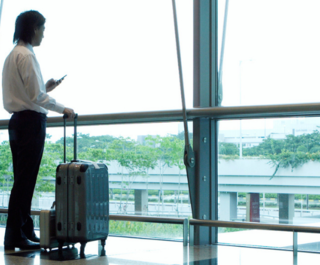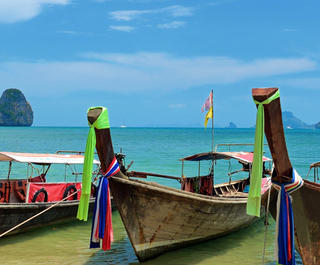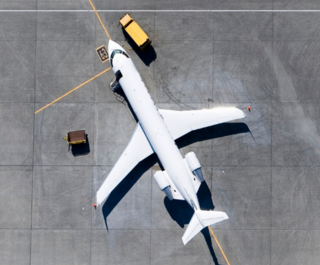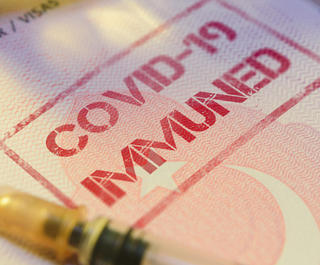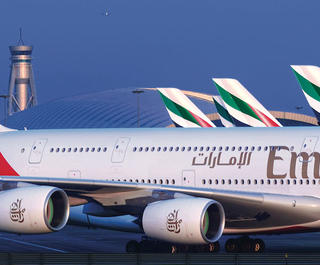
**UPDATE 27/10/17**
In July of this year the United States Department of Homeland Security (DHS) along with the Transportation Security Administration (TSA) announced the gradual introduction of increased security measures for people travelling to the US.
The new protocols include additional screening of passengers and electronic devices as well as the introduction of heightened security standards for airlines and airports.
What countries are included in the enhanced security measures?
More than 100 countries and 280 airports that operate direct services into the United States.
What airlines are affected?
Any airline that flies into the United States is required to comply. Effective 26 October, five airlines have introduced additional security on their US flights in the form of either a brief ‘interview’ with boarding passengers or an additional departure card requirement. These airlines are:
- Air France (AF)
- Cathay Pacific (CX)
- Egypt Air (MS)
- Emirates (EK)
- Lufthansa (LH)
What are the new measures travellers can expect?
- Enhanced overall passenger screening, including security ‘interviews’;
- Heightened screening of personal electronic devices;
- Increased security protocols around aircraft and in passenger areas; and
- The deployment of advanced technology, expanding canine screening, and establishing additional pre-clearance locations.
Does this mean that other countries will be subject to an electronics ban?
No. The recent ban on the carriage of personal electronics in the cabin on aircraft travelling to the United States has changed. A number of airlines were recently restricted on the carriage of personal electronics however all flights operated by Etihad (EY), Emirates (EK), Qatar (QR) and Turkish Airlines to the US are now exempt.
Only the following airline services to the USA are currently affected by the personal electronics ban:
- Amman, Jordan (AMM)
- Cairo, Egypt (CAI)
- Casablanca, Morocco (CAS)
- Jeddah, Saudi Arabia (JED)
- Kuwait City, Kuwait (KWI)
- Riyadh, Saudi Arabia (RUH)
How will these measures affect you if you're travelling to the USA now?
At this time, we strongly recommend that if you're travelling to the United States, you should adhere to the following:
- Arrive at the airport at least three hours prior to your flight. This will ensure that you have time to clear security, particularly in the event of any delays.
- You should travel with a print out of your ESTA or (where applicable) your visa documentation and know the address of your hotel or where you are staying on arrival.
- You should be aware of any restrictions regarding the carriage of electronic items (as outlined in the electronics FAQ).
- If you intend to carry personal electronics on board the aircraft, you should ensure that you are able to power up your devices if required, at the security check.
- Some of your items may be required to be removed from their protective cases or outer packaging.
What are my options if I don’t want my electronics screened or I can’t power them up?
Some airlines recommend that you pack your personal electronics (powered off) in your check-in luggage. This may be an option but be aware that these items may not be covered by travel insurance when packed in check-in luggage. Please check with your insurance provider.
Where can I get more information?
You can refer to the Department of Homeland Security website (https://www.dhs.gov/) and refer to the enhanced aviation security. We also suggest that you refer to your airline directly about their specific policies and conditions of carriage.
**UPDATE 25/09/17**
A revised travel ban has been introduced by the President of the United States as his previous iteration was due to expire. The changes are due to take effect from 18 October 2017 and involve citizens of additional countries.
What are the new restrictions?
The new rules include the suspension of all immigrant visas for nationals of Chad, Iran, Libya, North Korea, Somalia, Syria and Yemen, and the suspension of non-immigrant visas, such as for business and tourism, to nationals of Chad, Libya, North Korea, Syria and Yemen. Somali citizens applying for non-immigrant visas will be subject to additional screening. Iranian citizens are also banned (all immigrant and non-immigrant visas) however an exception is made for student and cultural visas – provided they receive additional screening. Only certain government officials from Venezuela are banned from entering the USA.
What about people with a ‘bone fide’ connection to the USA?
People who can prove a genuine and close connection (as below) may apply for a visa up to 18 October. After that date, these exceptions may no longer apply.
- Prove a close familial relationship with someone in the USA (immediate or grandparents).
- Have a proven and documented business relationship with an entity or organisation in the USA.
- Students registered at a US educational institution, someone with an offer of employment or someone invited to attend a conference or deliver a lecture would be permitted to enter.
What about dual citizens?
If someone is a citizen of one of the eight listed countries and another (such as Australia, New Zealand, Britain etc) they are not subject to the restrictions above. They will however require a visa and to travel on a passport other than from one of the restricted nations.
What about US residents, current visa holders or Green Card holders?
Citizens of one of the restricted nations who are also US residents, citizens, Green Card holders or holders of current valid visas are not subject to these restrictions. Bear in mind that the US border and immigration authorities still reserve the right to refuse entry to anyone, even those holding valid ESTAs or visas.
What about refugees?
The current refugee ban is due to expire on 24 October 2017. The policy for refugees after this date is not immediately clear.
What about people who have visited one of the listed nations since March 2011?
Regardless of your nationality, if you have visited Iran, Libya, Somalia, Syria or Yemen since March 2011, you will need a visa to enter the USA. You will not be able to travel on an ESTA. Chad, North Korea and Venezuela are not currently included in this.
Travellers are strongly advised to apply for their visa at least two months prior to travel. The process may be expedited but it is best to allow as much time as possible.
Anyone who has any questions about their travel status or visa validity must contact their nearest US embassy or consulate.
This FAQ does not constitute visa advice. Visa advice can be obtained from the US Department of Homeland Security or your nearest US embassy or consulate. US Consulate in Australia: 1300 139 399.
**UPDATE 28/6/2017**
**UPDATE 17/3/2017**
A US federal judge has blocked President Donald Trump's latest revised executive order reintroducing a travel ban imposed on certain countries, which was due to take effect on March 16. Until further notice, there is no travel ban in place for citizens of Iran, Libya, Somalia, Sudan, Syria or Yemen.
This means:
- Citizens and dual citizens of any of the six countries who hold an existing visa, US citizenship or a Green Card to enter the USA may do so.
- Citizens and dual citizens of one of the six listed nations may continue to apply for visas to enter the USA, including refugee visas.
- Iraqi citizens were exempt from the most recent version of the ban and may enter the USA as before.
- There is no change to the ESTA requirement for citizens of visa waiver countries.
We strongly advise that you apply for your visa at least two months prior to travel. We also strongly recommend that anyone who has any questions about their travel status or visa validity, contacts their nearest US embassy or consulate.
**UPDATE 7/3/2017**
On March 6, 2017, US President Donald Trump issued a revised executive order to reintroduce the travel ban that was previously blocked by the federal court. Among other things, the revised order imposes a ban on entry to the USA for citizens of Iran, Libya, Somalia, Sudan, Syria and Yemen for at least 90 days. Iraq is no longer on the list of banned countries. This new travel ban takes effect from March 16, 2017, and as it stands, would deny these citizens entry to the USA until at least June 14, 2017.
This replaces the previous travel ban which was overturned by the Federal Court. It is important to note that the American Civil Liberties Union (ACLU) and other organisations intend to dispute this order also.
Who is banned this time?
People who are citizens of Iran, Libya, Somalia, Sudan, Syria or Yemen will be denied entry to the USA from March 16, 2017. Iraqi citizens were previously included and are now exempt. There is a 120-day suspension on the entry of any refugees (including Syrian refugees who were previously banned indefinitely).
What are the exceptions?
There are some important exceptions:
- Citizens of any of these six countries listed above who hold an existing visa, US citizenship or a Green Card to enter the USA that was also valid as at January 27, 2017, will be able to enter from March 16.
- Dual citizens of one of the six listed nations and another (not listed) country may apply for a visa to enter the USA from March 16, 2017. Please note: these people should travel on a passport other than the one they have for the banned country.
- Citizens of these countries who are inside the USA at the time of this ban are exempt but may not be able to return if they leave the USA.
- Certain diplomats and government officials.
- Hardship cases (on a case-by-case basis).
I am an Iraqi citizen. Can I travel freely to the USA now?
You are not banned from entry but you will still require a visa.
Note: This FAQ does not constitute visa advice. Visa advice can be obtained from the US Department of Homeland Security or your nearest embassy or consulate.
Contacts:
US Consulate in Australia: 1300 139 399 or https://au.usembassy.gov/
**UPDATE 6/2/2017**
As of Friday, February 3, a US federal judge overturned the travel ban on entry to the USA for citizens of Iran, Iraq, Libya, Somalia, Sudan, Syria and Yemen. This was appealed by the US Government, but the appeals court has upheld the ruling and so, for now, the travel ban has been lifted.
Citizens of the seven listed countries (whether dual nationals or not) who hold a valid visa, may now (until further notice) enter the USA as before.
Citizens of these seven countries may also apply for new visas to travel to the USA but should anticipate delays in processing at this time.
Here's the updated FAQ on what we know at this time.
Does this mean that the borders are fully open again?
Yes and no. At this time, the court’s blocking of the travel ban means that until further notice, people who are citizens of Iran, Iraq, Libya, Somalia, Sudan, Syria and Yemen may enter the USA as long as they are holding an appropriate visa.
What about dual citizens?
People who are citizens of one of the seven countries and another country will still require a valid visa. If someone is a citizen of one of these seven countries and a visa waiver country (such as Australia, NZ, and the UK) they are still ineligible for an ESTA and will also require a valid visa.
How do I apply for a US visa?
We strongly advise that you apply for your visa at least two months prior to travel. The process may be expedited but it is best to allow as much time as possible. You should begin your visa application here.
I am a dual national as described above but I do not currently have a valid passport for a visa waiver country. Can I still get a visa?
No. You will need to obtain this ‘visa waiver country’ passport in order to apply for your US visa.
I am a citizen of one of the seven countries and I also have US permanent residency, a Green Card or US citizenship. Can I travel to the USA?
Under the current ruling, you will be able to enter the USA. We strongly recommend that anyone who has any questions about their travel status or visa validity, contacts their nearest US embassy or consulate.
Can my travel consultant contact the US consulate on my behalf?
It is best if you contact the consulate yourself due to the personal nature of the information and the identity verification they will require. You should have your passport details handy when you are speaking to the consulate.
I have visited one of the seven banned countries since March 1, 2011. Can I travel to the US?
Whether a citizen of one of the seven countries or not, you will require a visa to enter the USA if you have visited Iran, Iraq, Libya, Somalia, Sudan, Syria or Yemen since March 1, 2011. You must contact your nearest US consulate or embassy for further advice.
I am not a citizen of one of these countries, nor have I visited any of them since March 1, 2011. What do I need to do to travel to the USA?
If you are a citizen of a visa waiver country (including Australia, New Zealand, Britain), you will be required to hold a valid ESTA.
I was affected by the ban and adjusted my travel arrangements accordingly. Can I change them again since I can now travel?
Please speak to your Flight Centre travel expert. Our airline and wholesale partners are working with us to help all of our affected customers. We will do all we can to re-accommodate you.
I am not personally affected by the ban but no longer wish to travel to the United States at this time.
We suggest that you refer to the Australian Department of Foreign Affairs and Trade advice on the United Sates before making any decision about your travel. Please be aware that normal change and cancellation fees apply to customers who are not directly affected by this executive order.
Will this all change again?
Unfortunately it may, as we have already seen significant changes to the original executive order in the first week. We suggest that you stay in close contact with your travel consultant and continue to refer questions to the US embassy or consulate nearest you.
Contacts:
US Consulate in Australia: 1300 139 399 or https://au.usembassy.gov/
** UPDATE 31/1**
There have been some developments overnight about the executive order to ban citizens of Iran, Iraq, Libya, Somalia, Sudan, Syria and Yemen from entering the United States for 90 days.
The United Kingdom, Australia, Canada and New Zealand (NZ is yet to be formally confirmed) have negotiated entry to the USA for their dual nationals.
This means that people who are citizens of one of the seven banned nations and also citizens of Australia, the UK, Canada or (to be confirmed) New Zealand only, will be eligible to travel to the USA if they obtain the appropriate visa.
Who cannot enter the USA?
- For the next 90 days: Citizens of Iran, Iraq, Libya, Somalia, Sudan, Syria and Yemen who do not also hold citizenship and a valid passport for the United Kingdom, Australia, Canada or New Zealand.
- The above dual citizens who do not have a valid visa to enter the USA.
- For the next 120 days: Any refugees from any nation.
- Indefinitely: Refugees from Syria.
Who can enter the USA?
- Citizens of Iran, Iraq, Libya, Somalia, Sudan, Syria and Yemen who also hold citizenship and a valid passport for the United Kingdom, Australia, Canada or New Zealand with a valid visitor visa to enter the USA.
- Citizens of visa waiver countries holding a valid ESTA.
- For the next 90 days: Citizens of Iran, Iraq, Libya, Somalia, Sudan, Syria and Yemen who are also US citizens or permanent residents.
- For the next 90 days: On a case-by-case basis, citizens of Iran, Iraq, Libya, Somalia, Sudan, Syria and Yemen who are also US Green Card holders.
Even if you are a dual national who can now enter on a valid visa, we recommend you confirm your status by contacting your nearest US embassy or consulate, and obtain that confirmation in writing.
Please be aware that any new visa applications will likely take longer to process, so allow as much time as possible before travel.
If you do not hold dual citizenship and your travel plans have been disrupted, please contact your Flight Centre travel expert for more information.
News broke over the weekend that President Donald Trump has signed a new immigration ban that could affect millions of travellers. Effective immediately, this new policy puts tougher restrictions on crossing the US border if you are a citizen of one of seven countries. What does the new immigration ban mean for you? Here's the FAQ on what we know at this time.
What did the executive order implement?
Along with new policies surrounding refugees, a 90-day ban will also be placed on entry to the USA for all citizens of Iran, Iraq, Libya, Somalia, Sudan, Syria and Yemen – it is this ban that will have the largest impact on travellers.
Does the ban include dual nationals?
Yes. People who have dual citizenship of a visa waiver country and one of the countries listed above will be affected by the ban. This includes those who have automatic citizenship through their fathers excluding Iraq. These changes are in addition to being ineligible for an ESTA due to changes in the program last year.
What if I am a citizen of one of the seven countries but have a current visa for the USA? Can I travel?
Initially this was not clear. Over the weekend, people with valid visas were denied entry to the USA. If you have a valid tourist visa, student visa or working visa and you are a citizen of one of these seven countries, you will be denied boarding.
I had to obtain a visa for the USA because I visited one of these countries since March 2011. Can I enter the US?
Yes. This ban is based solely on citizenship. If you have a valid visa, you will be allowed entry.
What if I am a citizen of one of these seven countries but I have a Green Card or residency for the USA?
Green Card holders will be admitted entry on a case-by-case basis and will have to contact their closest US embassy/consulate for advice. It was announced this morning by the US Secretary of Homeland Security that permanent residents will be permitted entry. You can read more about this HERE.
I am a citizen of one of these seven countries and a US citizen. Can I travel to the US?
Yes. If you hold a current and valid US passport, you will be admitted to the USA.
Will there be any changes for travellers from a visa waiver country?
At this stage there will be no changes. If you are a citizen of Australia, New Zealand, the UK or any visa waiver country your entry is not restricted as long as you hold a valid ESTA. The ban only applies if you are also a citizen of Iran, Iraq, Libya, Somalia, Sudan, Syria or Yemen.
How long will the ban be in place?
As it stands, the ban will be in place until 27 April 2017. We are unsure what will happen beyond the end of April at this time.
I am affected by this ban and due to travel within the next 90 days. What should I do?
Unfortunately, unless there are extreme extenuating circumstances, you will not be able to travel. We recommend you contact your nearest US embassy/consulate for confirmation.
For all affected Flight Centre customers that are due to travel, we will waive all change and cancellation fees for all departures within the next 90 days (up to and including 27 April 2017). Please contact your Travel Manager for more information.
Where can I find additional information about travelling to the USA at this time?
Here's a list of helpful websites with information about visas, US Embassies and travelling to the USA:
The US Customs and Border Protection website


